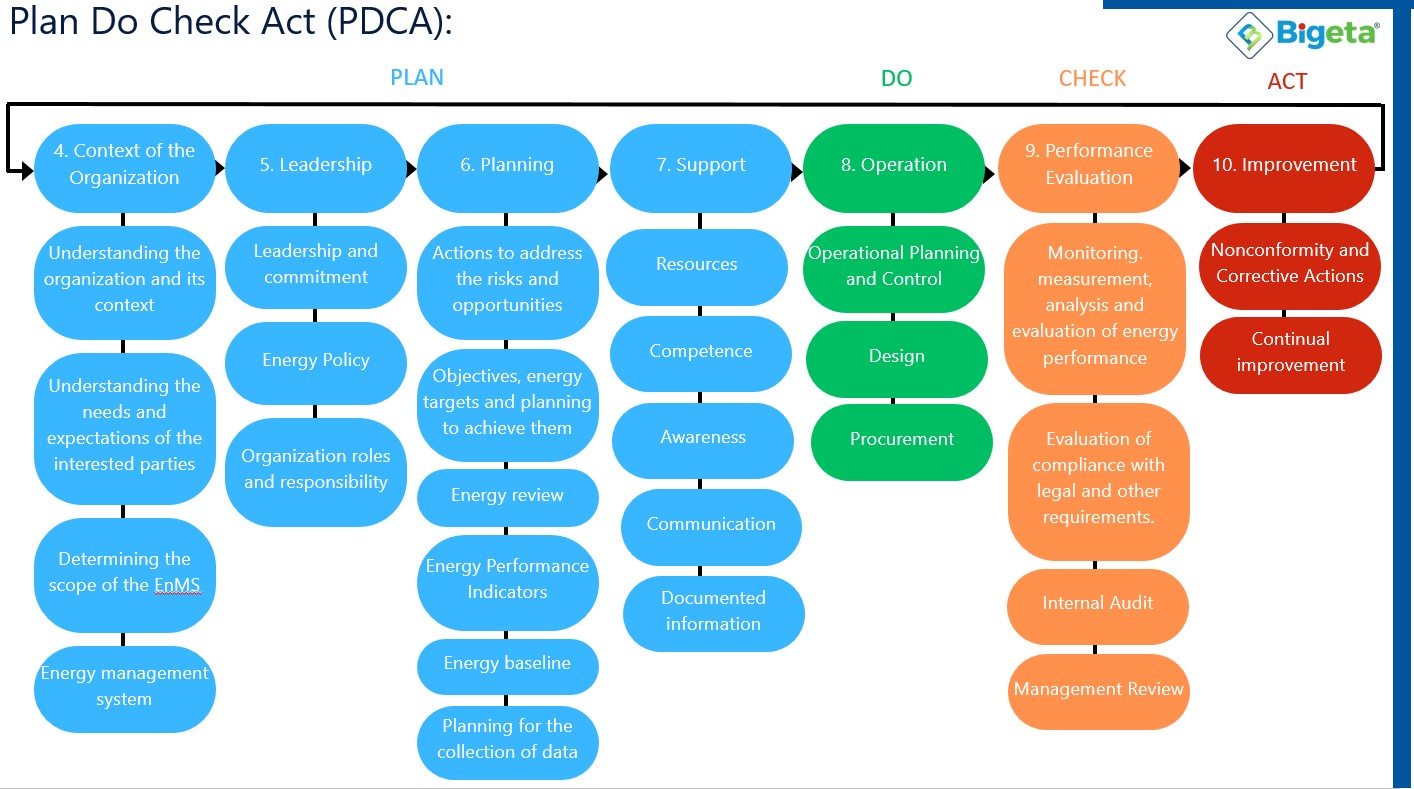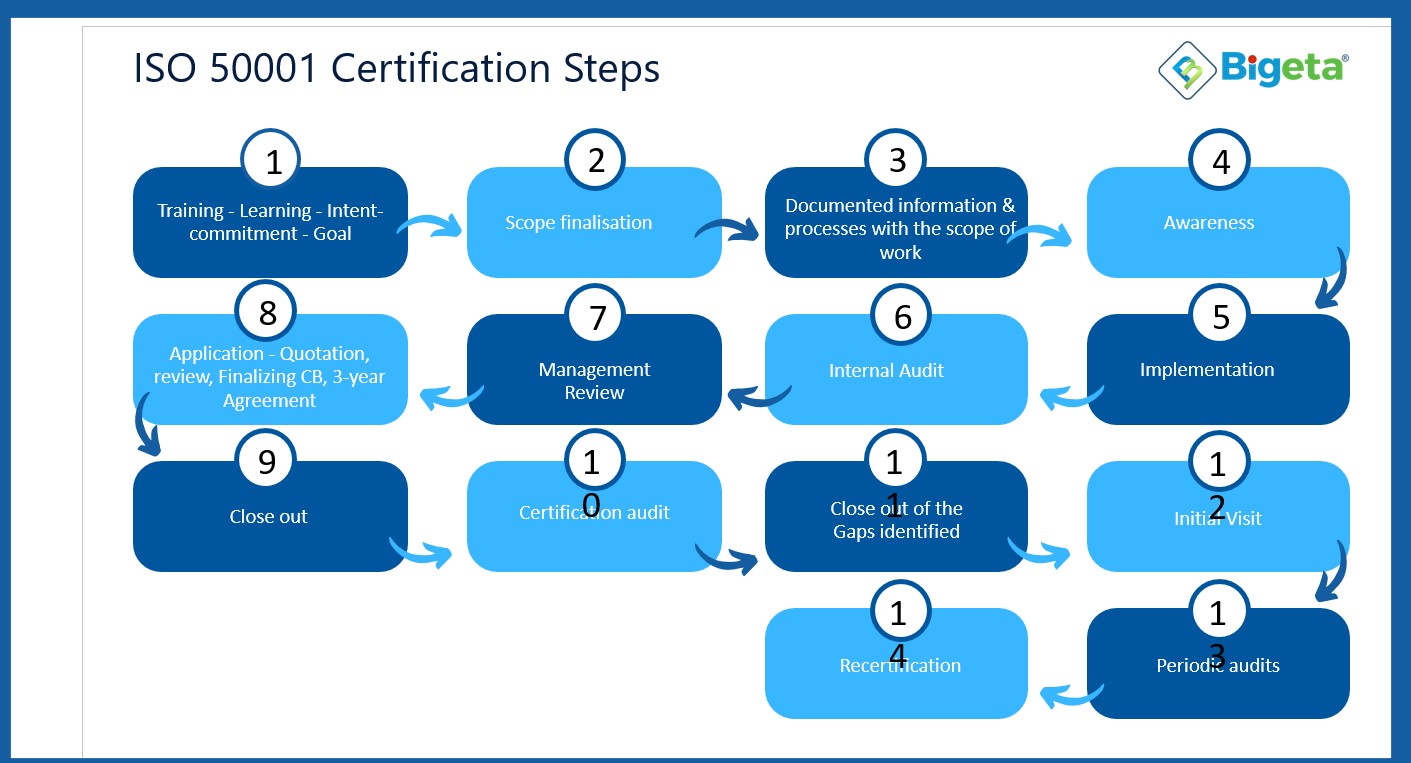
"Improve Productivity & Drive Profitability With ISO 50001"
ISO 50001:2018 Certification – Energy Management System
What is ISO 50001: 2018?
ISO 50001:2018 certification helps organizations optimise energy consumption and manage energy resources efficiently by establishing, implementing, maintaining, and improving their energy management systems through a structured framework. An Energy Management System (EnMS) is a set of interrelated or interacting elements designed to establish an energy policy, set energy objectives, and implement processes and procedures to achieve efficient energy management. Implementing an ISO 50001:2018 Energy Management System enables organizations to improve energy efficiency and reduce carbon dioxide emissions effectively. This leads to lower energy costs and increased profitability. Additionally, successful implementation raises employee awareness about energy conservation and promotes a culture of sustainability. An Energy Management System (EnMS) in compliance with ISO 50001:2018 focuses on energy uses, significant energy consumers, establishing energy baselines, and conducting energy reviews to effectively manage energy applications—ensuring efficiency without compromising production. The ISO 50001:2018 standard belongs to the same family as ISO 9001:2015 and follows the same High-Level Structure. As an internationally recognized management system standard, ISO 50001:2018 is focused on energy management systems, aiming to ensure their effective and efficient use in meeting future needs while adhering to the standard's guidelines.
Benefits of ISO 50001: 2018:
- Clear Energy Flow Visibility: Provides the organization with a clear understanding of energy flow.
- Active Energy Management: Enables active management of energy use and costs, achieving substantial improvements.
- Forecasting Potential Savings: Facilitates continuous and measured forecasting of potential cost savings.
- Energy Use Baseline: Helps develop a baseline for energy use.
- Continuous Improvement: Promotes continual improvement of energy use relative to product output over time.
- Reduced Emissions: Achieves reduced emissions without negatively impacting operations.
- Tax Benefits: Enables realization of tax benefits, if applicable.
- Leverage Existing Processes: Leverages existing continuous improvement processes for greater energy efficiency.
- Ongoing Cost Reductions: Leads to continuous reductions in energy consumption costs.
- Enhanced Reputation: Improves the company’s image and reputation through sustainable energy practices.
Our qualified energy management professionals can help you to achieve energy efficiency goals by providing continuous support in the process of implementing ISO 50001 Energy Management System.
Metering Survey
Customer Issue/Requirement
Deliverables
ISO 50001 Implementation Support
Customer Issue/Requirement
Deliverables
Assessment for identifying KPIs, bench-marking and target
Customer Issue/Requirement
Deliverables
Documentation support
Customer Issue/Requirement
Deliverables
Our qualified energy management professionals can help you to achieve energy efficiency goals by providing continuous support in the process of implementing ISO 50001 Energy Management System.
ISO 50001 provides a framework of requirements enabling organizations to:
- Identify internal and external issues that impact energy management.
- Establish interested parties, legal requirements, scope, and boundaries.
- Develop a policy aimed at improving energy efficiency.
- Assign roles and responsibilities within the organization.
- Set targets and objectives to align with the energy policy.
- Identify significant energy uses, establish energy performance indicators, and create an energy baseline.
- Use data to gain insights and make informed decisions regarding energy use and consumption.
- Identify organizational competencies and raise awareness about the Energy Management System (EnMS).
- Measure performance and results against set targets.
- Internal audit and Management Review.
- Non-Conformity and corrective actions.
- Review the effectiveness of the energy policy.
- Continuously improve energy management practices over time.
PDCA Framework:
Similar to other management system standards published by the International Organisation for Standardization (ISO), ISO 50001 is based on the PLAN-DO-CHECK-ACT approach to achieve continual improvement in energy performance
Plan: understand the context of the organization, establish an energy policy and an energy management team, consider actions to address risks and opportunities, conduct an energy review, identify significant energy uses (SEUs) and establish energy performance indicators (EnPIs), energy baseline(s) (EnBs), objectives and energy targets, and action plans necessary to deliver results that will improve energy performance in accordance with the organization's energy policy.
Do: implement the action plans, operational and maintenance controls, and communication, ensure competence and consider energy performance in design and procurement.
Check: monitor, measure, analyse, evaluate, audit and conduct management review(s) of energy performance and the EnMS.
Act: take actions to address nonconformities and continually improve energy performance and the EnMS.

Certification Process:

